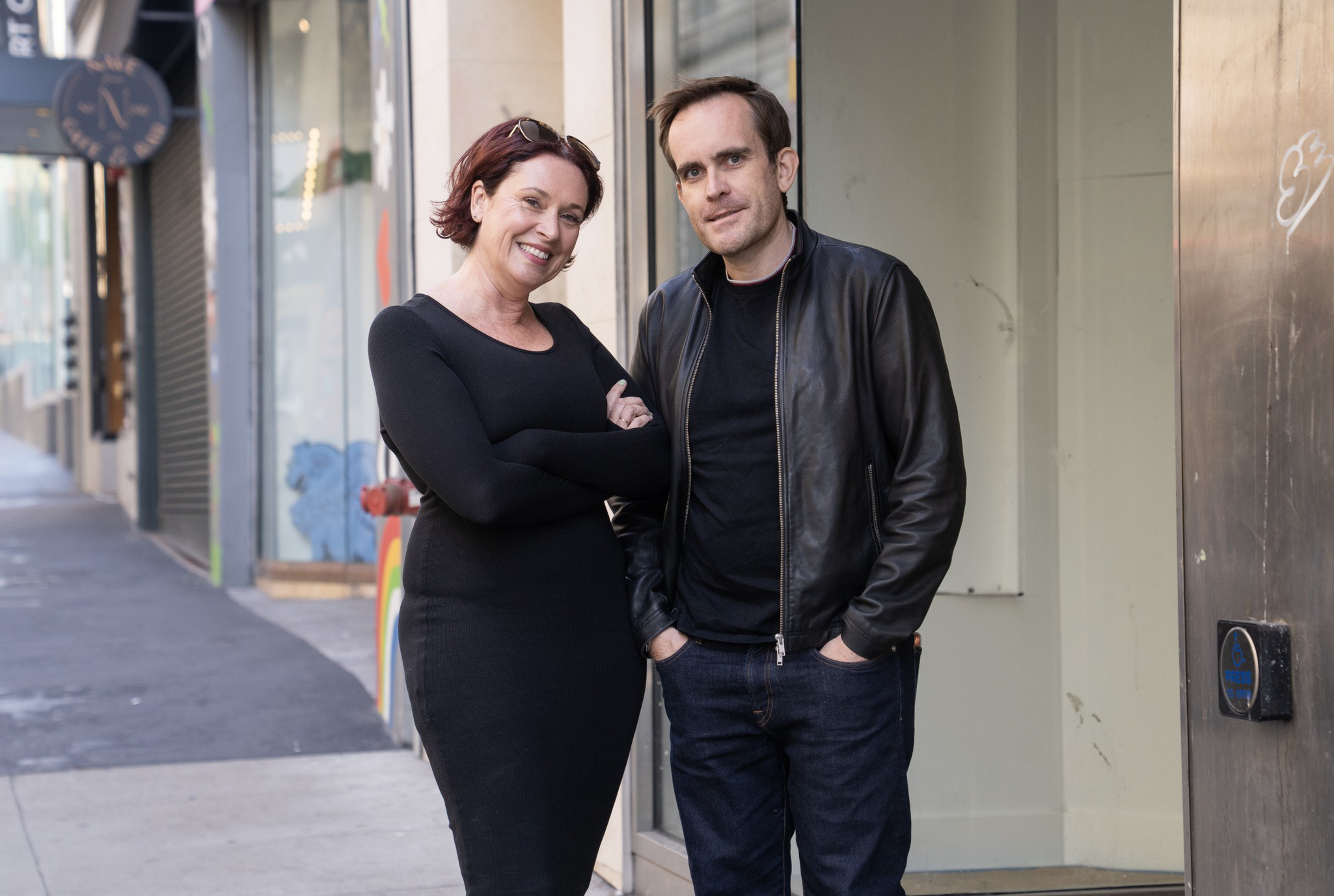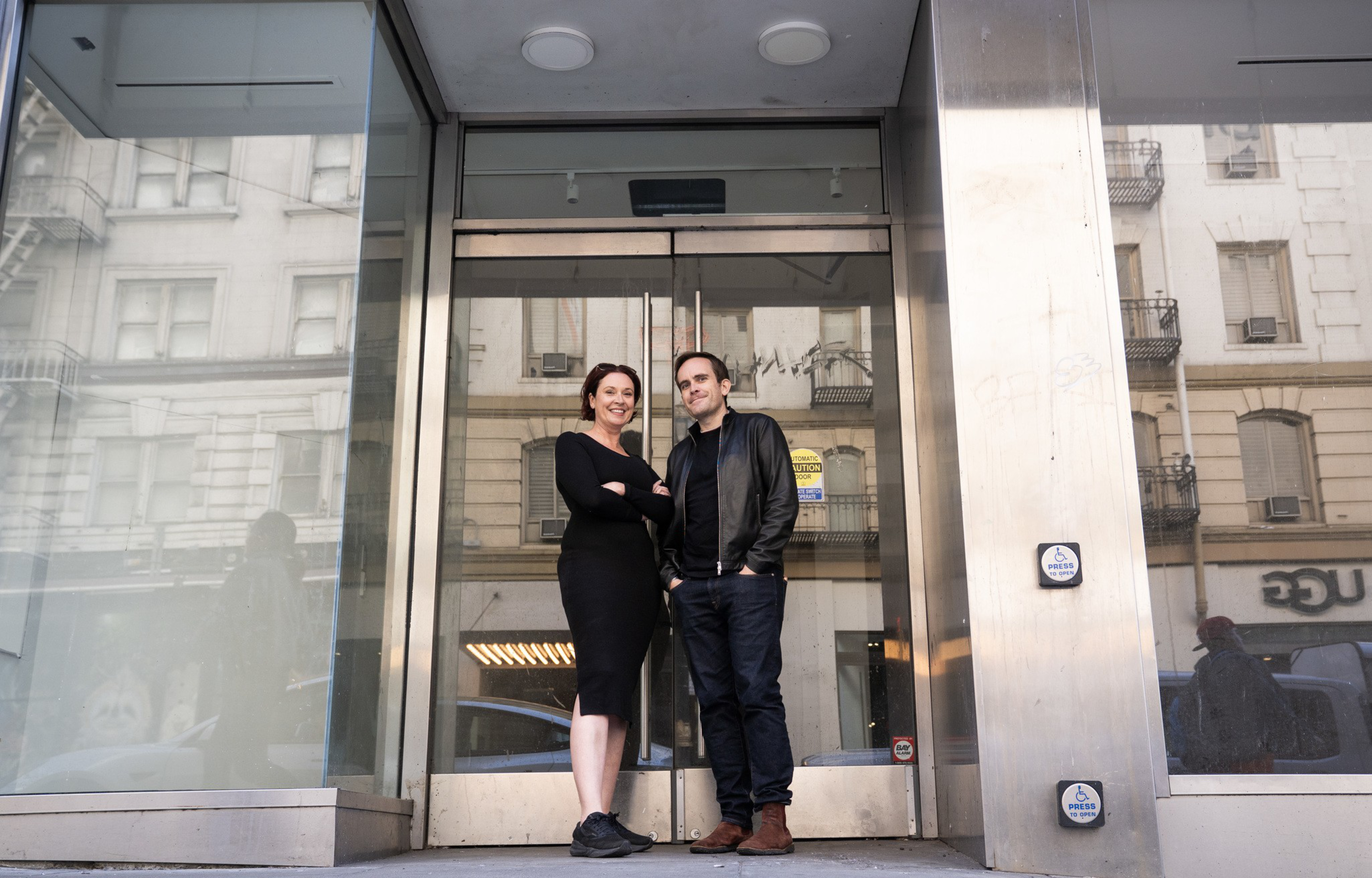When Paul Carr and Sarah Lacy founded the only bookstore in Palm Springs, where they bought a second home just before the pandemic, the recovering tech journalists joked about how much harder it would have been back at home in San Francisco, where opening anything can be a spirit-crushing slog.
Now, a few years later, the couple says they were wrong.
As they prepare to open in Union Square — filling a gaping hole in the city’s indie bookstore landscape — they can’t believe how easy the process has been.
“I am not effusive about the government,” says Carr, 45, a novelist and columnist who has written several pieces for The Standard. “I love when something is bad, because it gives me something to complain about. But there has been nothing to complain about up to today. It has been absolutely flawless.”
“It’s amazing,” adds Lacy, 49, the former CEO of tech news site PandoDaily. And “very un-SF.”
The ease of entry to the city’s shopping hub was one of several surprises for the couple since turning a new leaf as booksellers. For one thing, they didn’t expect the business to be so lucrative.
They also didn’t think they’d fall in love with Union Square, which provides the name for their venture: The Best Bookstore in Union Square. (In a city famous for bookstores, Carr says, “we definitely don’t make any claim to be the best bookstore any more broadly than that.”)
Carr says he was “pretty cynical” about Union Square: “Like, what do you mean it’s coming back? But now you can see it’s very much what it was in 2008.”
“No, it’s not,” Lacy interjects. “It’s better.”
The marquee retail district may have lost about half its stores in recent years, but it has welcomed a host of local merchants thanks to a suite of city initiatives helping small businesses move into San Francisco’s struggling downtown.
Mayor Daniel Lurie’s PermitSF (opens in new tab) streamlines approvals, and SF Shines (opens in new tab) dispenses grants. The Downtown SF Vibrancy Loan Fund recently doubled its matching grants to $50,000 for every $100,000 borrowed by a small business, and SF New Deal helps pop-ups parlay their momentum to become permanent operations. The mayor’s “Heart of the City” plan, unveiled in September, has raised more than $50 million in private-sector commitments to clean up downtown streets and support small businesses.
Since launching two years ago, the Vacant to Vibrant (opens in new tab) program — which Lacy and Carr credit for helping them find a spot and secure a lease — has turned 26 empty spaces into active storefronts. More than half the tenants that started as pop-ups through the initiative went on to sign long-term leases.
Union Square, as a result, feels more “local” than Lacy can remember.
“When we turned around and looked around,” she says, “it wasn’t just Gucci and Nordstrom and Nintendo and designer stores. We have Dandelion Chocolate (opens in new tab), that toy store Just for Fun, (opens in new tab) we have Nooworks (opens in new tab).”
The next wave of downtown Vacant to Vibrant openings include a café concept from SPRO Coffee Lab called The Wild Fox (opens in new tab), which debuts next week at 123 Battery St., and The Intersection for Art and Technology (TIAT (opens in new tab)), a salon and exhibition space hosting its grand opening Friday at 151 Powell St.

Later this month, Off the Grid (opens in new tab) will move into its first-ever brick-and-mortar storefront, at 111 Powell St. in Union Square, in time to open a holiday market. Clothing boutique Fibers of Being (opens in new tab) will expand into a second location with a pop-up at 645 Market St.
“The city’s bringing the neighborhoods to Union Square,” Lacy says. “It’s become the front door of San Francisco.”
For Lacy and Carr, it’s also a way back to Silicon Valley — but this time as booksellers instead of muckrakers.
‘There will be books’
After a combined half-century in journalism, much of it covering the excesses and amorality of Silicon Valley, Lacy and Carr decided during the pandemic to hunker down in Palm Springs, where they’d bought a home in 2019 and their two children could attend school once in-person classes resumed.
They kept their home in the Mission but spent more of their time in the Coachella Valley, where they realized a conspicuous absence in their otherwise idyllic new town. “We find ourselves bitching about how there’s no bookstore in Palm Springs,” Carr says. “The closest one was a Barnes & Noble a dozen miles away in Palm Desert.”
“There’s that old saying that if you can’t see the sucker in the room, it’s you,” Lacy adds. “After talking enough about how someone should really open one up, we decided that ‘someone’ might as well be us.”
Using equity from their second home, which appreciated significantly after the pandemic brought an influx of people to the resort town, they launched The Best Bookstore in Palm Springs just before Thanksgiving in 2022. They anticipated sales of about $600 on the first day but made roughly a dozen times that. The first year brought about $1 million in revenue.
There had been pent-up demand in a literal bookstore desert. But their success also reflects a broader trend: Independent bookselling is doing well, actually.
“Every time somebody sees a bookstore, they’re pleasantly surprised it exists,” Carr says. “But the reality is that print books are selling in huge, huge numbers (opens in new tab), there are more bookstores opening than closing … and book publishing is doing better than it’s ever done before.”
Last year, the American Booksellers Association welcomed 200 new members — the most in decades — and reported 323 new brick-and-mortar, pop-up, or mobile bookshops across the country, a 31% increase over the previous year. The association says it expects 190 independent bookstores to launch through 2027. (Big chains are thriving, too. Barnes & Noble, which has 600 stores, opened 57 in 2024 and plans to launch 60 in 2025.)

The Bay Area, which has a vibrant indie bookstore scene, has seen some closures, including Alexander Book Company and The Magazine in San Francisco, but most of the city’s famous outlets managed to survive the pandemic and competition from mega-retailers.
After a few years of getting the hang of things at their Palm Springs shop, Carr and Lacy could have coasted off that success.
“We finally nailed it,” Lacy says. “But we’re absolute gluttons for punishment, so here we are doing the exact same thing in SF.”
Carr and Lacy are thankful that the city has cut through so much red tape that they were able to take their idea from kitchen-table conversation to a lease deal in a matter of weeks.
Now it’s a mad rush to get The Best Bookstore in Union Square ready for the most profitable time of the year for any retailer. The firm deadline to recoup as much of their initial investment as possible is Black Friday.
“We still have to get so many bookshelves for our teenagers to assemble,” Carr says.
“And we have to get hundreds of thousands of dollars of books from publishers,” Lacy adds, “and get those checked in and alphabetized.”
“Our grand opening,” Carr says, “is going to be Sarah and I and our team lying in a heap on the floor crying.”
“All we can say is there will be books, and piles of wood, and it will appear to be what it is: an independent bookstore,” Lacy says. “Hopefully people are gentle with us, because we’re doing this whether we’re ready or not.”
